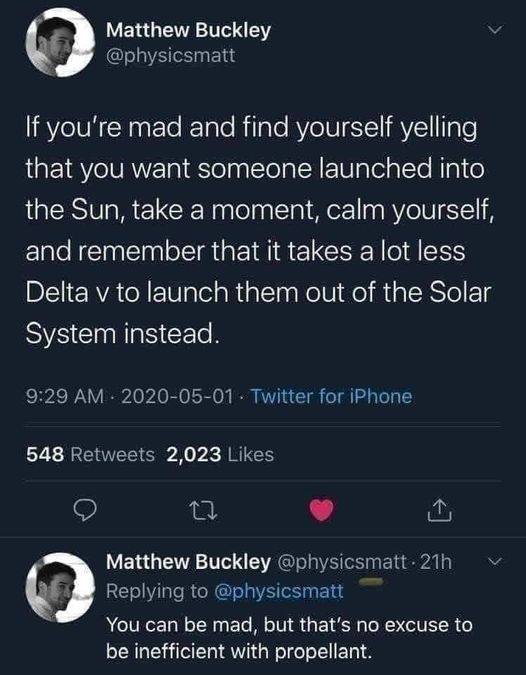this post was submitted on 13 Sep 2024
1584 points (99.3% liked)
Science Memes
10923 readers
2264 users here now
Welcome to c/science_memes @ Mander.xyz!
A place for majestic STEMLORD peacocking, as well as memes about the realities of working in a lab.

Rules
- Don't throw mud. Behave like an intellectual and remember the human.
- Keep it rooted (on topic).
- No spam.
- Infographics welcome, get schooled.
This is a science community. We use the Dawkins definition of meme.
Research Committee
Other Mander Communities
Science and Research
Biology and Life Sciences
- [email protected]
- [email protected]
- [email protected]
- [email protected]
- [email protected]
- [email protected]
- [email protected]
- [email protected]
- [email protected]
- [email protected]
- [email protected]
- [email protected]
- [email protected]
- [email protected]
- [email protected]
- [email protected]
- [email protected]
- [email protected]
- [email protected]
- [email protected]
- [email protected]
- [email protected]
- [email protected]
- [email protected]
- !reptiles and [email protected]
Physical Sciences
- [email protected]
- [email protected]
- [email protected]
- [email protected]
- [email protected]
- [email protected]
- [email protected]
- [email protected]
- [email protected]
Humanities and Social Sciences
Practical and Applied Sciences
- !exercise-and [email protected]
- [email protected]
- !self [email protected]
- [email protected]
- [email protected]
- [email protected]
Memes
Miscellaneous
founded 2 years ago
MODERATORS
you are viewing a single comment's thread
view the rest of the comments
view the rest of the comments

Why is that - wouldn't you be working against solar gravity? Like you don't have to get them there quickly, just launch them in some orbit that will decay and be taken in?
Because the Earth is really cookin', and ~~anything~~ anyone you hurl toward the sun will inherit that orbital velocity as well, meaning that they'll actually end up going around the sun, instead of into it. And due to the speed it would pick up on its way in, it would basically take up a highly-eccentric yet stable elliptical orbit.
"Well, what if we throw them in the other direction, to make up for it?" That's called retrograde, and that's basically exactly what you'd have to do: cancel out the Earth's entire orbital velocity. Which would take a lot of energy, plus a couple of really exacting gravity assists from planets on the way in.
(Edit to add: I may have explained this poorly. Basically, if you don't change your orbital speed at all, any movement you make toward or away from the host body means you just end up in an orbit of the same average distance, but in a more eccentric [elliptical] shape.)
By contrast, even though the escape velocity from the solar system is no slouch (42 km/s), you get to start with the Earth's orbital velocity (30 km/s)--meaning you're already a little under 3/4 of the way there. Plus, if you can make it to Jupiter and Saturn, you can get a significant gravity assist, and they're much bigger targets for such a maneuver than Mercury or Venus are.
So, yeah, bottom line: you only need a delta-V of about 12 km/s to get out of the solar system, but a delta-V of 30 km/s to get to the sun without going into orbit.
Why would you need to entirely cancel the earths orbital velocity, surely you just need to cancel a ~~tiny~~ bit of orbital velocity?
Edit: https://space.stackexchange.com/questions/43913/do-you-need-0-km-s-velocity-to-crash-into-the-sun
Canceling out only a tiny bit puts you on an orbit similar to earth's. You need to kill basically all of your momentum.
Good question, but if you cancel out only a little bit of orbital velocity, you just orbit in a little bit closer. Without any appreciable drag acting on you, there's nothing that will keep your orbit decaying. You'll just be in a smaller, perhaps slightly more eccentric orbit.
But you'd need a higher velocity to orbit closer...
Yeah, orbital mechanics gets a little bit mind-bendy sometimes. If you're in a stable circular orbit, accelerating in the direction you're traveling will actually result in you traveling more slowly because you have moved to a higher orbit, and firing engines to slow down will actually speed you up because you move in closer to the host body and take up a faster orbit.
This is actually a problem spacecraft deal with regularly. If a Dragon capsule is behind the ISS and wants to dock, using its thrusters to accelerate toward the ISS will actually result in it falling further behind. Decelerating will get it closer, though it will then be in a lower orbit. Orbital rendezvous is tough.